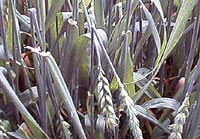
Background
Following the deregulation of the wheat industry in 1987, United Wheatgrowers (NZ) Ltd provided disaster relief insurance previously arranged through the New Zealand Wheat Board.
Currently under the Commodity Levies (Wheat Grain) Order 2020, United Wheatgrowers (NZ) Ltd collects a compulsory levy from New Zealand wheat growers on all wheat grain sold.

Levy rate
At the August 2023 AGM, the Electoral Committee advise that the levy remains at $3.75/t plus GST for the 01 February 2024 to 31 January 2025 collection period.
Levy Form - please click below link:
Levy Form

Use of the levy
United Wheatgrowers (NZ) Ltd spends the levy solely on disaster relief insurance and the administration cost of this insurance. This disaster relief insurance is a unique scheme run by wheat growers for wheat growers. Only wheat insurance schemes that meet the following conditions will be purchased:
- Provide a flat rate cover with no excess and no minimum loss
- Where the premium is paid on delivery of the product, and only on the tonnage delivered
The level of cover is based on cost of production, and will be set at slightly below the lowest expected value of wheat grain.

Levy Collection
The levy is collected from growers at first point of sale by collection agents - being any processor, wholesaler or retailer buying wheat grain or value-added processed product.
Growers selling wheat grain or value-added processed product to anyone other than collection agents are required to pay the levy directly to United Wheatgrowers (NZ) Ltd on a two-monthly basis. This process involves filing a new separate UWG levy form which is available both as a paper form or online via the Foundation for Arable Research website. The paper form is also available to download as a PDF above (under Levy Rate) or can be obtained from the UWG secretarial office of Brown Glassford (ph: 03 3650-881/email: info@uwg.co.nz)
United Wheatgrowers (NZ) Ltd and Foundation for Arable Research jointly engage an auditor annually to audit the levy collection processes of both UWG and the Foundation for Arable Research. A selection of both collection agents and individual wheat growers are audited.

The insurance contract for the 2023/2024 season with all detail is avaible to read per the below link.
Wheat Insurance Scheme - 2023-2024 - please click here for further information
In summary, the defined events in the contract are:
- Fire, lightning and explosion
- Hail
- Flooding beyond normal water course boundaries
- Wandering stock not belonging to, or under control of, insured
- Snow
- Frost
- Overturning of vehicle
- Aircraft or spatial device damage
- Earthquake, volcano or landslip
- Physical loss in silo or in transit
Note that there is a exclusion for acts of terrorism, including destruction or loss by opponents of genetic engineering. No insurance protection is provided for these acts.
Crops are insured from 1 November in any growing season, with the exclusion of frost which is covered from the 15th November. There is an extension for re-sowing early damaged crops. In this circumstance, either the cost of re-sowing the wheat crop (or another crop if agreed with FMG), or the cost of fertiliser and/or fungicide applied to the abandoned damaged crop, is payable.
Cover is currently $245 per tonne loss, or costs of re-sowing provided they do not exceed $245 per tonne of expected yield multiplied by the area affected. This is an increase from last year.
Claims
Should a wheat grower experience an event which is covered by the United Wheatgrowers (NZ) Ltd disaster relief insurance, the grower should immediately contact FMG on:
0800 366 466
Once notified, FMG will issue a formal claim form to be submitted within 14 days of the event.
FMG will then employ a member of the electoral committee or director of United Wheatgrowers (NZ) Ltd from the appropriate region to assess the damage to the effected crop. Once the damage has been assessed and processed, and actual tonnages delivered have been finalised, the settlement can be made.
In the event of frost damage not being recognised immediately, the damage should be notified as soon as reasonably possible.
No harvest of a damaged crop shall take place before FMG is notified.







